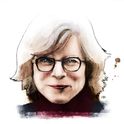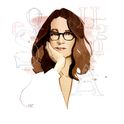What is the first news event you can recall?
It may not be the very first, but the assassination attempt on Pope John Paul II stands out vividly. It was widely reported that a Turkish terrorist had tried to kill the Pope. I was about 10 years old in Madrid, attending an international school where I was the only Turkish student. I remember being horribly bullied for weeks by the other children, and feeling embarrassed as if I had done something wrong myself. Suddenly, you are not seen as an individual anymore. I think many people from immigrant or minority backgrounds can relate to this kind of loneliness.
What is the biggest problem of all?
Numbness. The biggest problem is that we are caring less about the world’s major issues. The scariest moment is when we become desensitised—atomised, indifferent, frozen inside. Unable to empathise, unable to connect. I think we’re living in the Age of Angst. Everyone is anxious, old and young, east and west; the only difference is that some are better at hiding it than others. But it would be more troubling if it became the Age of Apathy.
If you could spend a day in one city or place at one moment in history, what would that be?
Two moments, if I may. First, I would have loved to spend a day in Germany around the 1440s beside Johannes Gutenberg as he developed the movable type printing press—the start of a revolution initiated not by violence, but by words and ideas. My second choice is 1st May 1851, London. I would have loved to witness the inauguration of the Great Exhibition in Hyde Park. Cultural and artistic connections, scientific achievements and intellectual interest in the world were all incredibly important and groundbreaking. Yet there were also negative aspects: contempt for other countries, a colonial sense of hierarchy and superiority. I would have loved to observe these nuances, the complexity of such a historic moment.
Which of your ancestors or relatives are you most proud of?
I am the creation of women. I was raised by my mother and my grandmother. Then there was my great-grandmother who liked to tell me strange stories in her old age. She would chat about food, then suddenly say something traumatic from her past, then return to something trivial. I would listen to her silences more than her stories. The ghosts of ancestors were still singing and dancing in the air. I have always felt deeply connected to my maternal lineage.
What have you changed your mind about?
When I was younger, I focused on people’s political inclinations. As I got older, I began to pay more attention to their character—whether they were kind, generous, loving, capable of empathy. I’m not saying politics isn’t important, especially in our current age of extreme politics, but while there’s a subtle connection between personality and politics, they’re not the same. Character is far more important.
What is the last piece of music, play, novel or film that brought you to tears?
I just read The Summer Book by Tove Jansson. It is beautiful, humble and timeless. I didn’t cry, but it really touched me.
You’ve just been awarded the British Academy’s President’s Medal. As part of that, you have to “publicly champion the humanities and social sciences”. Why is that important?
I love and appreciate interdisciplinary conversations and studies and am deeply honoured to receive the British Academy’s President’s Medal. As a storyteller and a novelist, I am not only interested in stories past and present, but also in silences. Literature is a natural bridge-builder; it connects hearts and minds, cultures and continents. Fiction opens up a much-needed and nuanced space for even the most sensitive and complex issues. It encourages empathy, connectivity and understanding, especially in these fractured times.
Does having a public role and a public presence affect your writing life at all?
I am an introvert. My natural habitat is a room full of books, where I can live happily in my pyjamas, writing and reading. However, it is an endless mystery to the introvert in me how much I genuinely enjoy attending literary festivals and events. I appreciate literary and cultural spaces and I do not take them for granted. They are among our last remaining democratic spaces where we can hold nuanced conversations and slow down to listen to each other.
What would people be surprised to know about you?
All my adult life, I’ve been a passionate metalhead. I especially love metalcore, Scandinavian, Viking, gothic metal bands, melodic death metal, and symphonic or progressive metal like Sleep Token or Lorna Shore. I also enjoy discovering heavy metal bands from all over the world, from Ukraine to Mongolia. I can listen to the same song 70 to 80 times on repeat—that’s how I concentrate.
Elif Shafak’s latest novel, “There are Rivers in the Sky” (Viking, £18.99), is out now in hardback












